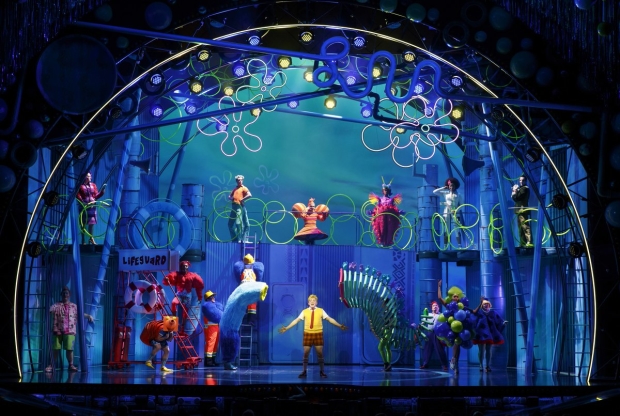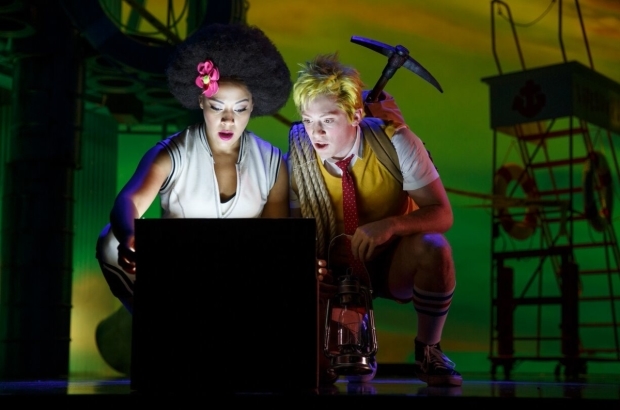TEDxBroadway Roundup: SpongeBob SquarePants Opens Theater to Infinite Possibilities

(© Joan Marcus)
What do SpongeBob SquarePants, Vanessa Carlton, and the Rat Czar have in common? It turns out they all — at least tangentially — make their own unique contributions to the theater community at large. "Community" is the operative word as it always is at TEDxBroadway, the annual congregation of Broadway minds at New World Stages where people both inside and outside the industry propose ways to make this microcosm we live in a little more productive.
Each of the dozen speakers who contributed to yesterday's conference (TEDxBroadway's sixth edition) showed restraint with the low-hanging fruit of a political rant-fest — especially considering the fact that the event landed only a week after President Trump's proposal to slash federal funding for the arts from 0.004 percent of the national budget all the way down to zero percent. TEDxBroadway co-organizer Damian Bazadona (founder of the entertainment marketing agency Situation Interactive) touched on the subject in his yearly update about the Situation Project, which works to bring New York City public school students to Broadway theaters. The simple and profound question he posed was, "Is zero percent an appropriate representation of the value of arts in our country?"
The short answer was an unequivocal no, but the day's remaining speakers had much more eloquent responses.
The Lion King veteran Alton Fitzgerald White described the mentality of "service" that was required to perform the role of Mufasa 4,308 times on Broadway, and the way a mind toward service continually fosters the creation and delivery of art. Lester Vrtiak embodied that spirit of service with a presentation on the Sing For Hope Pianos — instruments that are placed in public spaces throughout New York City to encourage spontaneous music-making (a sing-along to Vanessa Carlton's "1,000 Miles" demonstrated its joyful consequences). Lance Weiler also offered a presentation on his work blending storytelling and technology — projects that include My Sky Is Falling, a story-based experience that raises awareness for people aging out of the foster care system, and a Columbia University School of the Arts initiative called The Empathy Lab.
Youth and education was another focus of conversation throughout the day. Fifteen-year-old Ella Martin represented the organization Broadway for All with an incredibly poised speech about the value of bringing together theater students from all racial and socioeconomic backgrounds. And Gus Rogerson, producing director of the 52nd Street Project, introduced a performance of an original song with lyrics penned by one of the program's teenage protégés.
Several speakers emphasized the value of proper storytelling outside the limited realm of theater as well. Kanya Balakrishna spoke about the Future Project, an initiative in public schools that teaches what she calls the "skill" of dreaming — an imaginative (end effective) goal-setting exercise absent from most curricula. Desmond Upton Patton described his work studying and reframing the connections between youth violence in communities of color and the social media that pervades these populations. Even New York City Department of Health representative Caroline Bragdon, who claims the affectionate title of "rat czar," illustrated the shift in rat infestations where communities have adopted new narratives of ownership and responsibility. As most of the day's speakers reinforced over the course of the afternoon, affecting change through stories is unfailingly achieved by injecting them with empathy.
Empathy and possibility, as Tina Landau, the director and co-conceiver of the Broadway-bound SpongeBob Musical, explained in one of the most insightful talks of the day.
A plain cardboard box was apparently the primary inspiration for her cartoon-to-stage musical, whose influences range from the 1980 indie film The Gods Must Be Crazy to the avant-garde Dada art movement. With an expanded imagination, the empty space of a proscenium can be anything and everything you imagine, leaving room for limitless diversity, dimension, and dynamic thought. Sure, the tried-and-true formulas of storytelling are always cozier — but shutting the lid on progress is no longer an option.

(© Joan Marcus)










